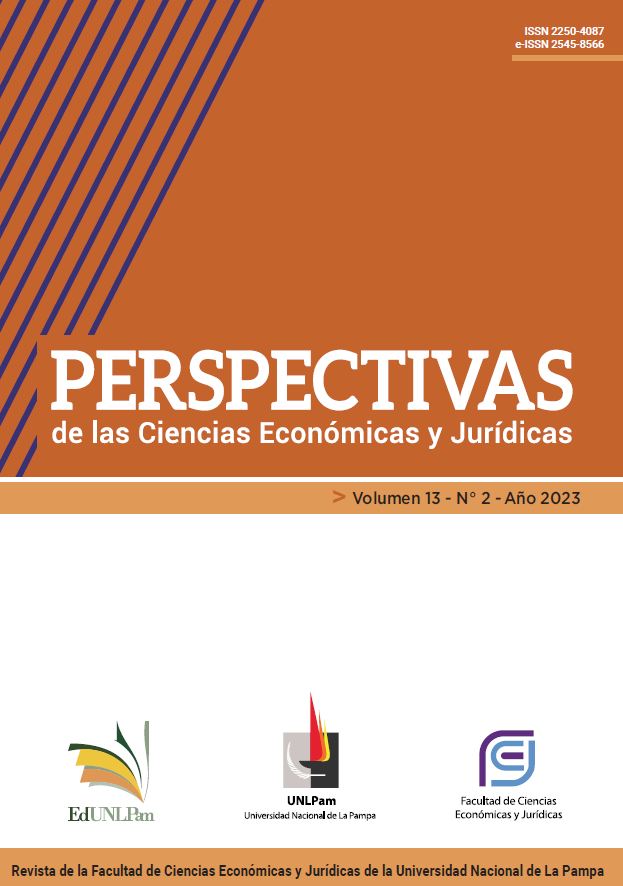El Foro Económico Mundial y la productividad
The world economic forum and productivity. Historical bases of competitiveness
DOI:
https://doi.org/10.19137/perspectivas-2023-v13n2a11Keywords:
World Economic Forum; Productivity; Management; Competitiveness.Abstract
This research, first, aims to bring to light the preponderant role that the World Economic Forum played in the late 1970s in the global dissemination of the concept of “competitiveness”. At the same time, it shows that from the beginning, for the World Economic Forum, the premise of “productivity” will lay the foundations for a reflexive, managerial and economic way of thinking, which will focus on the advantage of competitors. In other words, this seeks to think of the historical, quantitative ideas of productivity and “business growth” as the starting point of competitiveness. As a result, secondly, it will be explained that, particularly since the 1980s, the emphasis placed on growth will become more complex in the field of strategic management in terms of “competitive strengthening”. The strengthening of competitiveness itself will include qualitative dimensions and an integral strategic vision to think offensively and defensively not only about the management of enterprises, but also, therefore, about the economy of nations. Thus, this research sociologically problematises the contemporary notion of “competitiveness” and does so by highlighting the actors, discourses, and central reconfigurations of the concept in its historical development.
Downloads
References
Anca, H. D. (2012). Litterature review of the evolution of competitiveness. Annals of Faculty of Economics, 1(1), 41-46.
Bongers, A. y Torres, J. L. (2020). Factores determinantes del crecimiento económico: una comparativa a nivel mundial. Papeles de Economía Española, (164), pp. 15-40.
Clarke, J. y Newman, J. (1997). The Mangerial State. Sage Publications.
Davies, W. (2014). The Limits of Neoliberalism. Authority, Sovereignty and the Logic of Competition. SAGE Publications Ltd.
Fougner, T. (2006). The state, international competitiveness and neoliberal globalisation: is there a future beyond “the competition state”? Review of International Studies, 32, pp. 165-185.
Kantola, A. y Seeck, H. (2011). Dissemination of management into politics: Michael Porter and the political uses of management consulting. Management Learning, 42(1), pp. 25-47.
Kiechel III, W. (2010). The Lords of Strategy: the secret of intelectually history of the new corporate world. Harvard Business.
Mas, F. F. (2020). La competitividad como valor social. La gestión pública de turismo en la Argentina del siglo XXI. En D. Navarro-Drazich, Planificación turística I: Formulación. Reflexiones desde el oeste argentino (pp. 57-73). Universidad del Aconcagua.
----------. (2022). El principio reflexivo de la razón de empresa contemporánea: la competitividad. Economía y Sociedad, 27(62), pp. 1-17.
Porter, M. (1985). Competitive advantage: creating and sustaining superior performance. Free Press.
-----------. (1990). The competitive advantage of nations. Harvard Business Review, 68(2), pp. 71-91.
-----------. (1998 [1980]). Competitive Strategy: Techniques for Analyzing Industries and Competitors. Free Press.
-----------. (2017 [1998]). Ser competitivo: Edición actualizada y aumentada. Título original en inglés: On competition. Grupo Planeta.
Porter, M. y Schwab, K. (2008). The Global Competitiveness Report 2008-2009. World Economic Forum - SRO-Kundig.
World Economic Forum [WEF]. (2016). ¿Qué es la competitividad? weforum.org/es/agenda/2016/10/que–es–la–competitividad/
Downloads
Published
Issue
Section
License
Aquellos autores/as que tengan publicaciones con esta revista, aceptan los términos siguientes:- Los autores/as conservarán sus derechos de autor y garantizarán a la revista el derecho de primera publicación de su obra, el cuál estará simultáneamente sujeto a la Licencia de reconocimiento de Creative Commons que permite a terceros compartir la obra siempre que se indique su autor y su primera publicación esta revista.
- Los autores/as podrán adoptar otros acuerdos de licencia no exclusiva de distribución de la versión de la obra publicada (p. ej.: depositarla en un archivo telemático institucional o publicarla en un volumen monográfico) siempre que se indique la publicación inicial en esta revista.
- Se permite y recomienda a los autores/as difundir su obra a través de Internet (p. ej.: en archivos telemáticos institucionales o en su página web) antes y durante el proceso de envío, lo cual puede producir intercambios interesantes y aumentar las citas de la obra publicada. (Véase El efecto del acceso abierto).











.png)



5.jpg)












